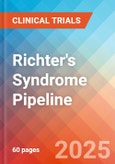Richter’s Syndrome: Understanding
Richter’s Syndrome: Overview
Richter syndrome (RS) represents the occurrence of an aggressive lymphoma, most commonly diffuse large B-cell lymphoma (DLBCL), in patients with chronic lymphocytic leukemia (CLL). Most cases of RS originate from the direct transformation of CLL, whereas 20% are de novo DLBCL arising as secondary malignancies. Multiple molecular mechanisms contribute to RS pathogenesis. B-cell receptor (BCR) overreactivity to multiple autoantigens is due to frequent stereotyped BCR configuration. Genetic lesions of TP53, CDKN2A, NOTCH1 and c-MYC deregulate DNA damage response, tumor suppression, apoptosis, cell cycle and proliferation. Hyperactivation of Akt and NOTCH1 signaling also plays a role. Altered expression of PD-1/PD-L1 and of other immune checkpoints leads to RS resistance to cytotoxicity exerted by T-cells. The molecular features of RS provide vulnerabilities for therapy. Targeting BCR signaling with noncovalent BTK inhibitors shows encouraging results, as does the combination of BCL2 inhibitors with chemoimmunotherapy. The association of immune checkpoint inhibitors with BCL2 inhibitors and anti-CD20 monoclonal antibodies is explored in early phase clinical trials with promising results. The development of patient-derived xenograft mice models reveals new molecular targets for RS, exemplified by ROR1. Although RS still represents an unmet medical need, understanding its biology is opening new avenues for precision medicine therapy.'Richter’s Syndrome- Pipeline Insight, 2025' report outlays comprehensive insights of present scenario and growth prospects across the indication. A detailed picture of the Richter’s Syndrome pipeline landscape is provided which includes the disease overview and Richter’s Syndrome treatment guidelines. The assessment part of the report embraces, in depth Richter’s Syndrome commercial assessment and clinical assessment of the pipeline products under development. In the report, detailed description of the drug is given which includes mechanism of action of the drug, clinical studies, NDA approvals (if any), and product development activities comprising the technology, Richter’s Syndrome collaborations, licensing, mergers and acquisition, funding, designations and other product related details.
Report Highlights
The companies and academics are working to assess challenges and seek opportunities that could influence Richter’s Syndrome R&D. The therapies under development are focused on novel approaches to treat/improve Richter’s Syndrome.Richter’s Syndrome Emerging Drugs Chapters
This segment of the Richter’s Syndrome report encloses its detailed analysis of various drugs in different stages of clinical development, including phase II, I, preclinical and Discovery. It also helps to understand clinical trial details, expressive pharmacological action, agreements and collaborations, and the latest news and press releases.Richter’s Syndrome Emerging Drugs
Duvelisib: Secura Bio
Duvelisib, is a small-molecule inhibitor of phosphoinositide-3 kinases that was designed initially to prove that simultaneous inhibition of the isoforms delta and gamma can produce a broad adaptative and innate immune cell inhibitory activity. The drug is currently in the Phase I/II stage of development for the treatment of Richter’s Syndrome and is being developed by Secura Bio.Epcoritamab: Genmab
Epcoritamab (DuoBody-CD3xCD20) is an investigational proprietary bispecific antibody created using Genmab’s DuoBody technology, jointly owned by Genmab and AbbVie Inc. It targets CD20 on the B-cells, a validated target that is expressed in a wide variety of B-cell malignancies. The drug is currently in the Phase I/II stage of its development for the treatment of Richter’s Syndrome.Richter’s Syndrome: Therapeutic Assessment
This segment of the report provides insights about the different Richter’s Syndrome drugs segregated based on following parameters that define the scope of the report, such as:Major Players in Richter’s Syndrome
- There are approx. 8+ key companies which are developing the therapies for Richter’s Syndrome. The companies which have their Richter’s Syndrome drug candidates in the most advanced stage, i.e. phase II include, Secura Bio.
Phases
The report covers around 10+ products under different phases of clinical development like
- Late stage products (Phase III)
- Mid-stage products (Phase II)
- Early-stage product (Phase I) along with the details of
- Pre-clinical and Discovery stage candidates
- Discontinued & Inactive candidates
Route of Administration
Richter’s Syndrome pipeline report provides the therapeutic assessment of the pipeline drugs by the Route of Administration. Products have been categorized under various ROAs such as- Oral
- Intravenous
- Subcutaneous
- Parenteral
- Topical
Molecule Type
Products have been categorized under various Molecule types such as
- Recombinant fusion proteins
- Small molecule
- Monoclonal antibody
- Peptide
- Polymer
- Gene therapy
Product Type
Drugs have been categorized under various product types like Mono, Combination and Mono/Combination.Richter’s Syndrome: Pipeline Development Activities
The report provides insights into different therapeutic candidates in phase II, I, preclinical and discovery stage. It also analyses Richter’s Syndrome therapeutic drugs key players involved in developing key drugs.Pipeline Development Activities
The report covers the detailed information of collaborations, acquisition and merger, licensing along with a thorough therapeutic assessment of emerging Richter’s Syndrome drugs.Richter’s Syndrome Report Insights
- Richter’s Syndrome Pipeline Analysis
- Therapeutic Assessment
- Unmet Needs
- Impact of Drugs
Richter’s Syndrome Report Assessment
- Pipeline Product Profiles
- Therapeutic Assessment
- Pipeline Assessment
- Inactive drugs assessment
- Unmet Needs
Key Questions
Current Treatment Scenario and Emerging Therapies:
- How many companies are developing Richter’s Syndrome drugs?
- How many Richter’s Syndrome drugs are developed by each company?
- How many emerging drugs are in mid-stage, and late-stage of development for the treatment of Richter’s Syndrome?
- What are the key collaborations (Industry-Industry, Industry-Academia), Mergers and acquisitions, licensing activities related to the Richter’s Syndrome therapeutics?
- What are the recent trends, drug types and novel technologies developed to overcome the limitation of existing therapies?
- What are the clinical studies going on for Richter’s Syndrome and their status?
- What are the key designations that have been granted to the emerging drugs?
Key Players
- Secura Bio
- Genmab
- Genentech
- Acerta Pharma BV
- Vincerx Pharma
Key Products
- Duvelisib
- Epcoritamab
- Venetoclax
- Acalabrutinib
- VIP152
This product will be delivered within 1-3 business days.
Table of Contents
Companies Mentioned (Partial List)
A selection of companies mentioned in this report includes, but is not limited to:
- Secura Bio
- Genmab
- Genentech
- Acerta Pharma BV
- Vincerx Pharma








